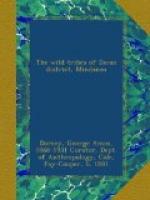[1] In Cibolan the midwife is called taratEk-Ekn, and need not be a mabalian.
[2] A medicine made of bark and rattan.
[3] The payment given at the birth of a boy is somewhat greater than that for a girl.
In Malilla the naming does not take place until three clays after the birth, and the eyes are not always anointed, although the old people agree that it is an ancient custom and “a good thing to do.” At that time the mat containing the gifts is spread on the floor and the offerings are again called to the attention of the spirits, who are urged to look to the welfare of the child. Should the infant be ailing, or cry a great deal, it is a sign that the spirits are displeased with the name given to it and another will be substituted; however, this does not seem to be done with an idea of fooling the spirits, as is the case with some other tribes. The child is nursed until two or three years of age, or until another takes its place. There is no superstition concerning twins, but triplets are at once put to death by filling their mouths with ashes, otherwise “the parents would die, for they are like dogs.”
When questioned concerning abortion, Datu Tongkaling asserted that he considered it “very bad,” and that he would prohibit any mabalian who assisted in such a practice from continuing her profession, but he said that despite his orders secret medicines which produce that result are sometimes administered. Such a practice is not common, however, as children are greatly desired and no worse slur can be applied to a woman than to speak of her as barren.
So far as could be learned there is no ceremony or celebration of any kind when a child reaches the age of puberty but soon thereafter its teeth will be filed and blackened. In some villages the boys are circumcised, but the practice is not compulsory, neither is it general throughout the territory.




